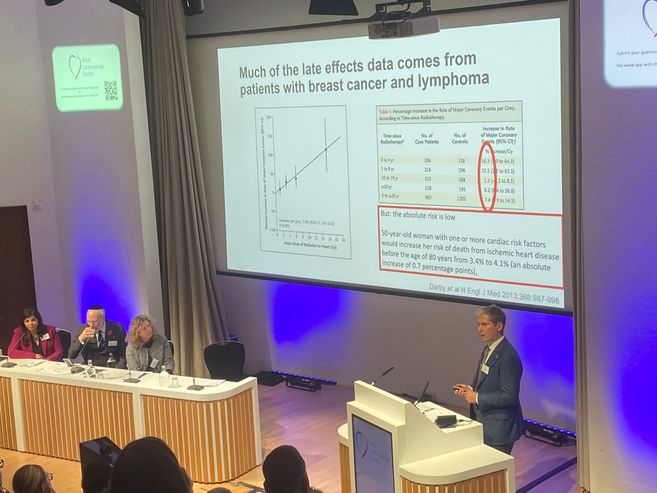Protecting the Heart During Lung Cancer Treatment: Leading the Way in Safer Radiotherapy
Radiotherapy for lung cancer can affect the heart, but advanced techniques like cardiac-sparing planning and proton beam therapy now allow us to treat cancer effectively while protecting heart health. Learn how Dr James Wilson leads the way in safer, personalised lung cancer care.


As a Clinical Oncologist specialising in lung cancer treatment, I'm passionate about not just treating cancer, but ensuring my treatments are as safe as possible for every patient. Yesterday, I had the privilege of presenting at the British Cardiovascular Society/British Cardio-Oncology Society/UCLH Cancer Academy Course at the Royal College of Physicians in London, sharing expertise on an important aspect of cancer care that often goes undiscussed: protecting the heart during radiotherapy.
What are the side effects of radiotherapy on the heart?
When treating lung cancer with radiotherapy, the heart often receives some radiation dose due to its position in the chest. While we've always known this isn't ideal, recent research has shown just how important it is to minimise this exposure. Potential side effects can include:
-
Changes to heart rhythm
-
Damage to heart muscle
-
Increased risk of heart attacks and heart failure
-
Impact on heart valves
As my lung cancer treatments become more effective and patients live longer, protecting the heart becomes increasingly crucial for long-term survival and quality of life.
How do I protect the heart during lung cancer treatment?
One of the most exciting developments in my field is cardiac-sparing radiotherapy. This technique involves carefully optimising treatment plans to reduce the radiation dose to the heart while maintaining effective treatment of the cancer. It's not about compromising on cancer treatment – it's about being smarter with how we deliver that treatment.
What is proton beam therapy and how does it help?
For selected patients with lung cancer, I can offer proton beam therapy – an advanced form of radiotherapy that can be particularly effective at sparing the heart from unnecessary radiation. Benefits include:
-
More precise targeting of tumours
-
Less radiation to healthy tissue
-
Reduced heart exposure
-
Potentially fewer side effects
Unlike conventional radiotherapy, proton beams stop at a precise depth in the body, potentially reducing the radiation dose to the heart and other healthy tissues. This can be especially beneficial for patients whose tumours are close to the heart or who have pre-existing heart conditions.
What should my patients know about modern lung cancer treatments?
For patients considering radiotherapy treatment for lung cancer with me, these developments highlight several important points:
-
I use modern radiotherapy techniques that can be adapted to protect the heart
-
I personalise treatment based on individual risk factors
-
I provide enhanced follow-up care with both cancer and heart specialists to ensure comprehensive monitoring
-
My focus is on both treating cancer effectively and maintaining quality of life
How am I advancing lung cancer treatment?
The field of radiation oncology is constantly evolving, and I'm committed to staying at the forefront of these developments. In my practice, I offer:
-
Cardiac-sparing radiotherapy techniques
-
Proton beam therapy for selected patients
-
Advanced imaging technology
-
Personalised treatment planning
How do I provide personalised cancer care?
As I continue to advance my understanding and techniques, one thing remains constant – my commitment to personalised, expert care for every patient. By considering each person's individual circumstances, including their heart health, I work with patients to choose the most appropriate treatment approach.
If you're concerned about radiation therapy and heart health, I encourage you to book an appointment to discuss this with me. As a specialist in this field, I'm here to ensure you receive the most appropriate and safest treatment for your situation.
If you’ve been told you have lung cancer and want to talk about your treatment options, get in touch here.